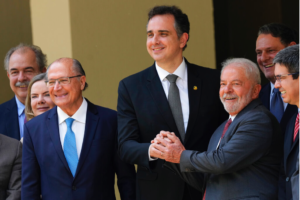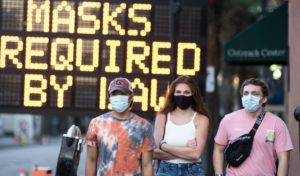
On August 9, 1974, amidst the ongoing Watergate scandal — just a few days after the “smoking gun” tape was released, implicating President Richard Nixon in the crimes committed by his subordinates — Gerald Ford was sworn in as the 38th President of the United States following Nixon’s resignation. Ford had no national mandate of his own during his presidency, his last election having been as a Representative for Michigan. He had served as House Minority Leader for about eight years, before being elevated to the Vice Presidency in 1973 after the previous Vice President resigned due to another scandal, thanks to his nearly unanimous support among Congressional leaders. Yet, with no mandate from the voters of the nation, Ford granted Nixon a “full, free, and absolute pardon” for any crimes he committed — just a month after his ascendance to the Presidency.
Ford had his own justifications for the pardon. He viewed it as being in the best interest of the country to move on from the scandalous and embarrassing saga of Watergate. Privately, he also carried a copy of a Supreme Court decision from 1915 — Burdick v. United States, which ruled that a pardon carried an “imputation [accusation] of guilt,” and that accepting a pardon was tantamount to an “admission of guilt.” Ford may have had a point in wanting to heal the nation and move on: the Watergate scandal shattered the public’s trust in the government, which has never fully recovered.
Yet, Ford also set a precedent that has lasted to this day — an “instinctual move to shy from holding presidents to account.” During Watergate, prosecutors deliberated heavily on whether or not to indict Nixon. However, Nixon’s pardon implicitly affirmed that indicting and prosecuting a President was still considered taboo — a notion that violates a key tenet of democracy: equality before the law. The same problem is not present in other democracies. Former French President Nicolas Sarkozy has been convicted twice for corruption and illegal campaign financing; former South Korean President Park Geun-hye received a hefty sentence for corruption, even though she has since been pardoned; former British Prime Minister Boris Johnson was fined for violating his own COVID regulations; and current British Prime Minister Rishi Sunak was fined for not wearing a seatbelt. The same universal accountability could not be said for the United States.
That is, until March 30, 2023, when a Manhattan grand jury indicted former President Donald Trump and charged him with 34 felony counts of falsifying business records. Pundits disagree about the strength of Manhattan District Attorney Alvin Bragg’s case, with some viewing it as particularly weak due to Bragg’s choice to charge Trump with felony counts of falsifying business records — requiring a much higher burden of proof that the falsifications occurred with “an intent to commit another crime or to aid or conceal the commission thereof.” Regardless of the strength of Bragg’s case, Trump’s indictment is a massive step forward — not only in its novelty but for the new precedent that has been set.
The Nixon precedent has undoubtedly been diminished, with effects that cannot be overstated. The “hush money” case in Manhattan is not the only investigation that Trump is facing; notably, he currently faces additional cases surrounding his attempts to interfere in Georgia during the 2020 presidential election, his connection with the insurrection on January 6, and his handling of classified documents at Mar-a-Lago. In each of these three cases, those leading the investigation will inevitably face the choice of whether or not to indict Trump. Prior to Bragg’s indictment, each of the cases would have been stifled by the same connotations of taboo surrounding the Nixon precedent.
But now, with Bragg having taken the first step in indicting Trump, the taboo has been broken — there is precedent for indicting a former President. Even though Bragg’s case, concerning hush money payments to a porn star, is the least serious compared to the other investigations surrounding classified documents and election subversion, it may facilitate the successful progression and completion of other, more serious cases.
In 1903, in his annual address to Congress, President Theodore Roosevelt said that “no man is above the law and no man is below it; nor do we ask any man’s permission when we required him to obey it. Obedience to the law is demanded as a right; not asked as a favor.” Trump’s indictment is one positive step in bringing Roosevelt’s ideal closer to reality.



